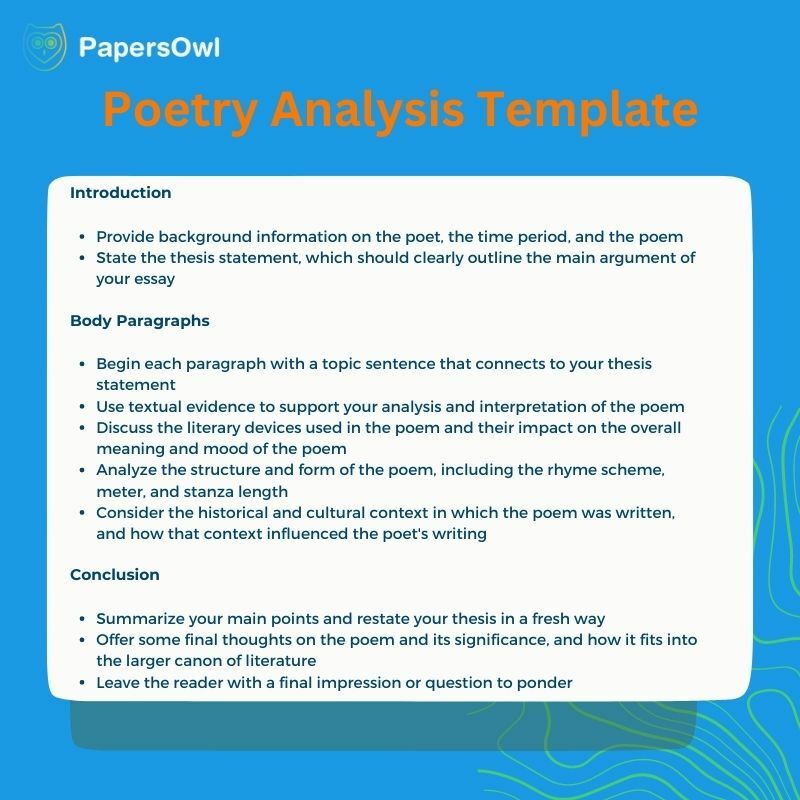How to Write a Poetry Essay: Step-By-Step-Guide
Table of contents
Edgar Allan Poe once said:
“Poetry is the rhythmical creation of beauty in words.”
The reader’s soul enjoys the beauty of the words masterfully expressed by the poet in a few lines. How much meaning is invested in these words, and even more lies behind them? For this reason, poetry is a constant object of scientific interest and the center of literary analysis.
As a university student, especially in literary specialties, you will often come across the need to write a poetry analysis essay. It may seem very difficult when you encounter such an essay for the first time. This is not surprising because even experienced students have difficulty performing such complex studies. This article will point you in the right direction and can be used as a poetry analysis worksheet.
What Is A Poetry Analysis?
Any poetry analysis consists in an in-depth study of the subject of study and the background details in which it is located. Poetry analysis is the process of decomposing a lyrical work into its smallest components for a detailed study of the independent elements. After that, all the data obtained are reassembled to formulate conclusions and write literary analysis. The study of a specific lyric poem also includes the study of the hidden meaning of the poem, the poet’s attitude and main idea, and the expression of individual impressions. After all, the lyrics aim to reach the heart of the reader.
The goal of the poetry analysis is to understand a literary work better. This type of scientific research makes it possible to study entire categories of art on the example of specific works, classify them as certain movements, and find similarities and differences with other poems representing the era.
A poetry analysis essay is a very common type of an essay for university programs, especially in literary and philological areas. Students are often required to have extensive knowledge as well as the ability of in-depth analysis. Such work requires immersion in the context and a high level of concentration.
How to Choose a Poem for Analysis?
You are a really lucky person if you have the opportunity to choose a poem to write a poetry analysis essay independently. After all, any scientific work is moving faster and easier if you are an expert and interested in the field of study. First of all, choose a poet who appeals to you. The piece is not just a set of sentences united by a common meaning. Therefore, it is primarily a reflection of the thoughts and beliefs of the author.
Also, choose a topic that is interesting and close to you. It doesn’t matter if it is an intimate sonnet, a patriotic poem, or a skillful description of nature. The main thing is that it arouses your interest. However, pay attention to the size of the work to make your work easier. The volume should be sufficient to conduct extensive analysis but not too large to meet the requirement for a poem analysis essay.
Well, in the end, your experience and knowledge of the poetry topic are important. Stop choosing the object of study that is within the scope of your competence. In this way, you will share your expert opinion with the public, as well as save yourself from the need for additional data searches required for better understanding.

Poem Analysis Essay Outline
A well-defined structure is a solid framework for your writing. Sometimes our thoughts come quite chaotically, or vice versa, you spend many hours having no idea where to start writing. In both cases, a poem analysis outline will come to your aid. Many students feel that writing an essay plan is a waste of time. However, you should reconsider your views on such a work strategy. And although it will take you time to make a poetry analysis essay outline, it will save you effort later on. While a perfect way out is to ask professionals to write your essays online, let’s still take a look at the key features of creating a paper yourself. Working is much easier and more pleasant when you understand what to start from and what to rely on. Let’s look at the key elements of a poem analysis essay structure.
The essence of a poetry essay outline is to structure and organize your thoughts. You must divide your essay into three main sections: introduction, body, and conclusions. Then list brainstormed ideas that you are going to present in each of these parts.
Introduction
Your essay should begin with an introductory paragraph. The main purpose of this section is to attract the attention of the reader. This will ensure interest in the research. You can also use these paragraphs to provide interesting data from the author of the poem and contextual information that directly relates to your poem but is not a part of the analysis yet.
Another integral part of the poem analysis essay introduction is the strong thesis statement. This technique is used when writing most essays in order to summarize the essence of the paper. The thesis statement opens up your narrative, giving the reader a clear picture of what your work will be about. This element should be short, concise, and self-explanatory.
Main Body
The central section of a literary analysis essay is going to contain all the studies you’ve carried out. A good idea would be to divide the body into three or four paragraphs, each presenting a new idea. When writing an outline for your essay, determine that in the body part, you will describe:
- The central idea.
- Analysis of poetic techniques used by the poet.
- Your observations considering symbolism.
- Various aspects of the poem.
Make sure to include all of the above, but always mind the coherence of your poem literary analysis.
Conclusion
In the final paragraph, you have to list the conclusions to which your poetry analysis came. This is a paragraph that highlights the key points of the study that are worth paying attention to. Ensure that the information in the conclusion matches your goals set in the introduction. The last few lines of a poem usually contain the perfect information for you to wrap up your paper, giving your readers a ground for further thought.

Tips on How to Analyze a Poem
Now, having general theoretical information about what a poetry analysis essay is, what its components are, and how exactly you can make an outline, we are ready to move on to practical data. Let’s take a closer look at the key principles that you should rely on in the poetry analysis. As you might guess, just reading a poem will not be enough to make a comprehensive analysis. You have to pay attention to the smallest details to catch what other researchers have not noticed before you.
Title of the Poem
And although the poems do not always have a title, if the work you have chosen has a name, then this is a good basis for starting the poetry analysis. The title of the poetic work gives the understanding of what the poet considers to be the key ideas of his verse. In some cases, this element directly reflects the theme and idea of the poem. However, there are also common cases when the poet plays with the name, putting the opposite information into it. Look at the correlation between the title and the content of the poem. This may give you new clues to hidden meanings.
Poetry Background
To fully immerse yourself in the context of the verse, you need to study the prerequisites for its writing. Analyze poetry and pay attention to the period of the author’s life in which the work was written. Study what emotions prevailed in a given time. The background information will help you study the verse itself and what is behind it, which is crucial for a critical analysis essay. What was the poet’s motivation, and what sensations prompted him to express himself specifically in this form? Such in-depth research will give you a broad understanding of the author’s intent and make your poem analysis essay writing more solid.
This fragment of your poem analysis essay study also includes interpretations of all the difficult or little-known words. Perhaps the analyzed poem was written using obsolete words or has poetic terms. For a competent poem analysis, you need to have an enhanced comprehension of the concepts.
Structure of the Poem
Each lyrical work consists of key elements. The theory identifies four main components of a poem’s structure: stanza, rhyme, meter, and line break. Let’s clarify each of the terms separately so that you know exactly what you are supposed to analyze.
The stanza is also called a verse. This element is a group of lines joined together and separated from other lines by a gap. This component of the poem structure exists for the ordering of the poem and the logical separation of thoughts.
The next crucial element is rhyme. This is a kind of pattern of similar sounds that make up words. There are different types of a rhyme schemes that a particular poem can follow. The difference between the species lies in the spaces between rhyming words. Thus, the most common rhyme scheme in English literature is iambic pentameter.
The meter stands for a composite of stressed and unstressed syllables, following a single scheme throughout the poem. According to the common silabotonic theory, the poem’s rhythm determines the measure of the verse and its poetic form. In other words, this is the rhythm with which lyrical works are written.
Finally, the line break is a technique for distinguishing between different ideas and sentences within the boundaries of one work. Also, the separation serves the reader as a key to understanding the meaning, thanks to the structuring of thoughts. If the ideas went continuously, this would create an extraordinary load on perception, and the reader would struggle to understand the intended message.
Writing an essay about poetry requires careful attention and analysis. Poems, although short, can be intricate and require a thorough understanding to interpret them effectively. Some students may find it challenging to analyze poetry and may consider getting professional help or pay to do an assignment on poetry. Regardless of the approach, it is essential to create a well-structured essay that examines the poem’s meaning and provides relevant examples.

Tone and Intonation of the Poetry
The tone and intonation of the poem could be analyzed based on two variables, the speaker and the recipient. Considering these two sides of the narrative, you can reach a better overview of the analyzed poem.
The first direction is to dig deeper into the author’s ideas by analyzing thematic elements. Pay attention to any information about the poet that can be gleaned from the poem. What mood was the author in when he wrote it, what exactly he felt, and what he wanted to share? What could he be hiding behind his words? Why did the poet choose the exact literary form? Is it possible to trace a life position or ideology through analysis? All of this information will help you get a clue on how to understand a poem.
The analysis of the figure of the recipient is also going to uncover some crucial keys to coherent study. Analyze a poem and determine whether the poem was written for someone specific or not. Find out whether the poet put motivational value into his work or even called readers to action. Is the writer talking to one person or a whole group? Was the poem based on political or social interests?
Language Forms and Symbols of the Poetry
Having sufficiently analyzed the evident elements of the poem, it is time to pay attention to the images and symbols. This is also called the connotative meaning of the work. It can sometimes get challenging to interpret poems, so we will see which other poetic techniques you should consider in the poetry analysis essay.
To convey intricate ideas and display thoughts more vividly, poets often use figurative language. It mostly explains some terms without directly naming them. Lyrical expression works are rich in literary devices such as metaphor, epithet, hyperbole, personification, and others. It may sometimes get really tough to research those poem elements yourself, so keep in mind buying lit essay online. Descriptive language is also one of the techniques used in poems that requires different literary devices in order to make the story as detailed as possible.
To fully understand poetry, it is not enough just to describe its structure. It is necessary to analyze a poem, find the hidden meanings, multiple artistic means, references the poet makes, and the language of writing.
Poetic devices
Poetic devices, such as rhythm, rhyme, and sounds, are used to immerse the audience. The poets often use figurative techniques in various poems, discovering multiple possibilities for the readers to interpret the poem. To discover the composition dedicated to the precise verse, you need to read the poem carefully. Consider studying poetry analysis essay example papers to better understand the concepts. It is a certain kind of reader’s quest aimed at finding the true meaning of the metaphor the poet has hidden in the poem. Each literary device is always there for a reason. Try to figure out its purpose.
Music of the Poem
Many poems formed the basis of the songs. This does not happen by chance because each poem has its own music. Lyrical works have such elements as rhythm and rhyme. They set the pace for reading. Also, sound elements are often hidden in poems. The line break gives a hint about when to take a long pause. Try to pay attention to the arrangement of words. Perhaps this will reveal you a new vision of the analyzed poem.
Purpose of Poem
While you analyze a poem, you are supposed to search for the purpose. Each work has its purpose for writing. Perhaps this is just a process in which the author shares his emotions, or maybe it’s a skillful description of landscapes written under great impressions. Social lyrics illuminate the situation in society and pressing problems. Pay attention to whether the verse contains a call to action or an instructive context. Your task is to study the poem and analyze the motives for its writing. Understanding the general context, and especially the purpose of the poet will make your analysis unique.
Poetry Analysis Template

To make it easier for you to research, we have compiled a template for writing a poetry analysis essay. The best specialists of the our writing service have assembled the main guides that will serve as a layout for your essay. If you need more support than just a template, full paper writing assistance is available to help you draft the entire analysis. Choose a poem that suits you and analyze it according to this plan.
Introduction:
- The title of the poem or sonnet
- The name of the poet
- The date the poem was first published
- The background information and interesting facts about the poet and the poem
Form:
- Identify the structure of the poem, and the main components
- Find out the data about the speaker and recipient
Meaning:
- State the purpose of the poem
- Distinguish the topic and the idea of the verse
Figurative language:
- Study the literary devices
- Search for the hidden meanings
Following these tips, you will write a competitive poem analysis essay. Use these techniques, and you will be able to meet the basic requirements for quality work. However, don’t forget to add personality to your essay. Analyze both the choices of the author of the poem and your own vision. First of all, beauty is in the eye of the beholder. Do not limit yourself to dry analysis, add your own vision of the poem. In this way, you will get a balanced essay that will appeal to teachers.
Example of Poem Analysis
Maya Angelou’s “Still I Rise,” is a powerful anthem of strength and resilience that has become an iconic piece of literature. The poem was written in the 1970s during the civil rights movement and was published in Angelou’s collection of poetry, “And Still I Rise,” in 1978. The structure of the poem is unique in that it is not divided into stanzas but is composed of a series of short phrases that are separated by semicolons. This creates a sense of continuity and momentum as the poem moves forward. The lack of stanzas also reflects the speaker’s determination to keep going, regardless of the obstacles she faces.
The tone of the poem is confident and defiant, with a strong sense of pride in the speaker’s identity and heritage. The intonation is rhythmic and musical, with a repeated refrain that emphasizes the theme of rising above adversity. The language forms used in the poem are simple and direct. One of the most powerful symbols in the poem is the image of the rising sun…
Our database is filled with a wide range of poetry essay examples that can help you understand how to analyze and write about poetry. Whether you are a student trying to improve your essay writing skills or a poetry enthusiast looking to explore different perspectives on your favorite poems, our collection of essays can provide valuable insights and inspiration. If, despite these resources, your workload is too high, professional services can do my assignments to alleviate pressure. So take a look around and discover new ways to appreciate and interpret the power of poetry!






